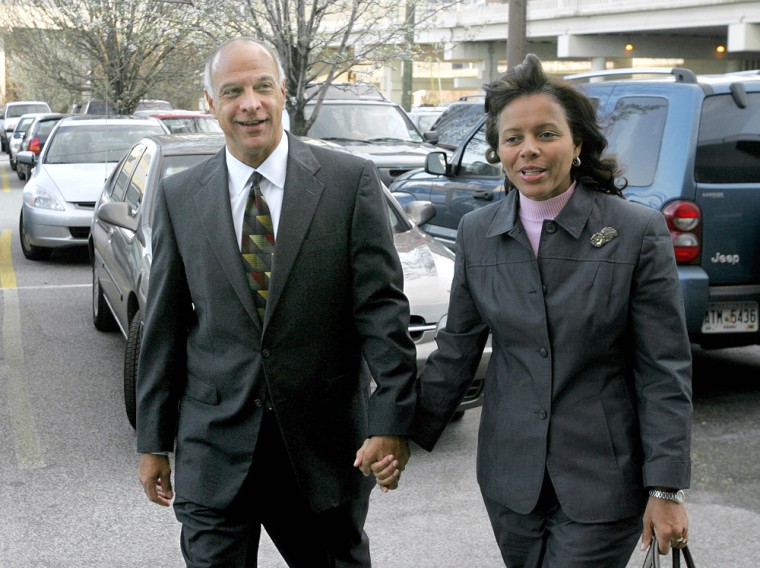Former Mayor Bill Campbell was acquitted Friday of lining his pockets with payoffs while guiding Atlanta through a period of explosive growth that helped secure its place during the 1990s as a world-class city. But the jury convicted him of tax evasion.
Campbell, 52, could get up to nine years in prison and $300,000 in fines, but legal experts have said it’s doubtful he would receive the maximum sentence.
The federal jury took a day and a half to acquit Campbell of racketeering and bribery after a seven-week trial that put his womanizing and his high-rolling, jet-setting ways on display with his wife sitting dutifully in the courtroom for most of the proceedings.
Campbell had no visible reaction as the verdict was read.
Later, outside court, he said he had “great regrets” that the jury convicted him of anything. “I know that I’m innocent,” he said.
A somber Campbell, who remained free on bail, described the tax charges as “fairly minor,” saying they were tied to his income from speeches and public appearances. He said he has always admitted keeping poor records of that income.
But, Campbell said, he was vindicated by the “substance” of the trial.
“I’m satisfied, to a degree, that my honor was restored,” he said.
More than 60 witnesses took the stand
The trial — with more than 60 witnesses, including two women with whom he had affairs — tarnished a long record of achievement, beginning at age 7, when Campbell became the lone black child to integrate the Raleigh, N.C., public school system.
Campbell, who served two terms as mayor from 1994 to 2002, was indicted two years after leaving office, snared in a federal corruption probe that has led to the convictions of 10 other former city officials and contractors.
Federal prosecutors charged that Campbell ran the biggest city in the South with a “what’s-in-it-for-me” attitude and regarded contractors who wanted to do business with Atlanta as “human ATMs.”
Prosecutors said he took more than $160,000 in cash, campaign contributions, junkets and home improvements in exchange for city contracts, and spent it on gambling trips to Mississippi River casinos and other getaways with his mistresses.
They said Campbell took in so much money in bribes that he withdrew a mere $69 from his personal bank accounts one year.
The defense countered that Campbell’s extra money came from his gambling winnings and speaking engagements, and that Campbell’s subordinates had used his name without his knowledge to enrich themselves.
Campbell’s lawyers repeatedly challenged prosecution witnesses with the same questions: Did the mayor ask you to do anything illegal? Did you see the mayor take any money? With few exceptions, the answers were no.
Campbell a federal prosecutor before
Campbell — a graduate of two of the South’s most distinguished schools, Vanderbilt University and Duke University law school — was a federal prosecutor and city councilman before getting elected mayor.
He presided over one of the most prosperous periods in Atlanta history. On his watch, the city grew for the first time in more than 30 years, adding 40,000 people. He was mayor when Atlanta had its moment on the world stage as host of the 1996 Olympics.
Campbell also helped transform Atlanta’s skyline, mostly by shepherding projects started by former Mayor Maynard Jackson. He presided over the construction of Philips Arena and high-rise condominiums and the virtual disappearance of housing projects.
While he easily won both of his mayoral elections, he was criticized by business interests as soft on crime, and he left the city with an $82 million budget deficit and a crumbling infrastructure.
His successor, Mayor Shirley Franklin, has worked to clean up what some see as Campbell’s messes.
After leaving office, he had a brief stint as a radio talk show host, then moved to Stuart, Fla., to practice law.
